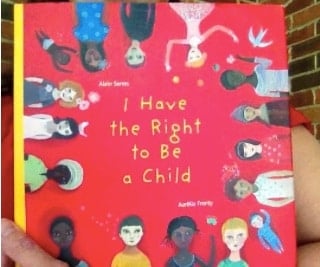
by Cindy Levin | Jun 10, 2014 | 2014, Childhood, Human Rights, Humanitarian, International, Kids, Multicultural, Social Equality, Social Good, United Nations, World Voice

I’ve recently introduced a picture book into my family’s reading time called “I Have the Right to Be a Child” by Alain Serres. With beautiful simplicity, the book provides the author’s interpretation of the United Nations Convention on the Rights of the Child. The Convention includes things like rights to education, gender equality, nutrition, health care, free speech, freedom from child labor, safety, etc. For kids, the book is a conversation starter about human rights. We talked a lot about the question, “What are rights and what are privileges?” For adults, the book is a reminder that these concepts really are not that complicated. It may be complicated in the implementation of granting rights, but when the rights themselves are asserted in the simple language of the children the Convention seeks to protect, it all becomes much more clear.

This is probably the first time my kids saw human rights presented in a way that was meaningful to them. In American museums and text books, the right to vote for women and people of color seems faraway and a “done deal.” They don’t think of those rights as things we continually need to address here and in other countries. My children often help me advocate to give children in developing countries access to school and vaccines, but the language of “rights” isn’t always included in those kinds of discussions.
My youngest really latched on to the page that said,
“I have the right to express myself completely freely, even if it doesn’t always please my dad, and to say exactly how I feel, even if it doesn’t always please my mom.”
We have a lively ongoing debate about how that plays out. If she has the right to express herself completely freely, how might that compete with my perceived right not to be disrespected in my own home or the rights of her other friends and family members?
It might be surprising to Americans to learn that while 194 states in the world have agreed to the Convention, the U.S. has not officially ratified it. In fact, every member of the United Nations except Somalia, the United States, and South Sudan are party to the Convention, having agreed to change or make laws and to develop practices and programs to support it. The U.S. has signed to show support, but hasn’t “ratified” it. Ratification requires being bound by international law and having to report regularly to the UN Committee on the Rights of the Child, which monitors compliance.
Why hasn’t the U.S. ratified? Katie Jay – author of the “Children Deserve Families” blog told me that recognizing that children have a right to a safe and secure permanent family is cutting edge human rights law. The idealistic part of me scoffs at that, saying;
“Really? Cutting edge? To provide security, safety, and nourishment to children is cutting edge?” But the lobbyist part of me knows that it can sometimes be a tricky thing for a country to formally declare something as a “human right.”
Because once you officially do that, then you have to do something about it…or be held accountable by an international authority and possibly give up your moral high ground if you are then seen as a country that doesn’t live up to its own standards. Sadly, from the standpoint of an American citizen who has watched our behavior on international environmental agreements with dismay, I can tell you that Americans generally don’t like the idea of international authority holding us accountable for just about anything.
Has your country ratified the Convention? Take a look at this paraphrased list of rights for children from the book and consider which of them you think are rights or privileges. Are all of them rights? What would be the ramifications for your country to truly grant that right in your country? Internationally? What benefits or problems do you see that could arise if the world embraced the Convention wholeheartedly?
- I have the right to a first name, a last name, a family, and a country that I can call my home.
- I have the right to have enough food to eat and water to drink.
- I have the right to live under a roof, to be warm, but not too hot, not to be poor and to have just enough of what I need, not more.
- I have the right to be cured with the best medicines that were ever invented.
- I have the right to go to school without having to pay.
- I have the same rights whether I am a girl or a boy.
- I have exactly the same right to be respected whether I am black or white, small or big, rich or poor, born here or somewhere else.
- I have the right to be helped by my parents, my friends, and my country if my body doesn’t work as well as other children’s.
- I have the right to be free from any kind of violence, and no one has the right to take advantage of me because I am a child.
- I have the right to go to school and refuse to go to work.
- I have the right to be protected by adults and to be sheltered from disasters
- I have the right never to experience war or weapons.
- I have the right to breathe clean air.
- I have the right to play, to create, to imagine, and also to have friends.
- I have the right to learn about friendship, peace and respect for our planet.
- I have the right to express myself completely freely.
This is an original post written for World Moms Blog by Cindy Levin.
Cynthia Changyit Levin is a mother, advocate, speaker, and author of the upcoming book “From Changing Diapers to Changing the World: Why Moms Make Great Advocates and How to Get Started.” A rare breed of non-partisan activist who works across a variety of issues, she coaches volunteers of all ages to build productive relationships with members of Congress. She advocated side-by-side with her two children from their toddler to teen years and crafted a new approach to advocacy based upon her strengths as a mother. Cynthia’s writing and work have appeared in The New York Times, The Financial Times, the Washington Post, and many other national and regional publications. She received the 2021 Cameron Duncan Media Award from RESULTS Educational Fund for her citizen journalism on poverty issues. When she’s not changing the world, Cynthia is usually curled up reading sci-fi/fantasy novels or comic books in which someone else is saving the world.
More Posts - Website
Follow Me:

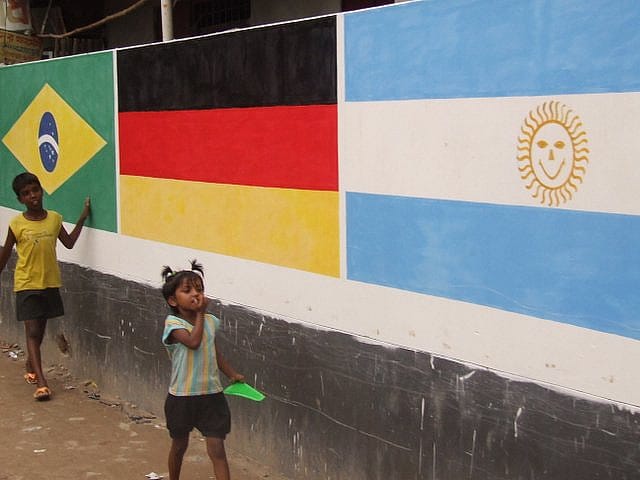
by Ecoziva (Brazil) | Jun 9, 2014 | 2014, Brazil, ONE, Spirituality, World Interviews, World Moms Blog Writer Interview

Even if you have heard very little about Brazil, you probably know soccer is a big thing here. In fact, for a long time Brazil was known mostly for its soccer, its Carnaval (its version of Mardi Gras), its beautiful women and, perhaps, its forests. Unfortunately, considering that Brazil is a huge and extremely diverse country in so many senses, that is a very limited view of the country. However, as we are a few days away of the World Cup, today I want to speak about soccer. The World Cup is something that has always brought about an overall sense of excitement, regardless of whether one is or not a soccer lover. It is the time people bring out their flags and most everyone shows a tad of patriotism. Of all of the World Cups I have witnessed in my lifetime, three come to mind. The first is also the first World Cup I remember, held in Mexico, in 1986. I lived in a small town in northeastern Brazil, and I recall being enthralled by the big, spontaneous party in the streets after Brazil won one of the games. There were firecrackers and people parading and dancing in the town plaza.
Others drove up and down the cobblestone streets honking their horns, the vehicles full of people half out of the windows or even on top of the cars, shouting “Brazil, Brazil!”, while waving their flags.
Unfortunately, Brazil did not win that cup, and the heavy silence that followed was a big contrast to that party, even to myself, who barely knew about soccer then and didn’t really understand what was going on. Fast forward to the 1990s. 1994 was a big mark, of course, because Brazil won the cup for the fourth time. I was a teenager and much of the excitement was because so-and-so players were cute. The mother of a friend got a couple of autographs of the team captain for me and a friend of mine, which I still have. The upside was that I was visiting family in the United States, where we watched the games together and where the cup was actually happening (although I didn’t go to any games live). On the other hand, I remember being somewhat bummed because I was still travelling when the players returned to Brazil and paraded in one of the main streets of my city to commemorate the victory. And, of course, there was a big party that I missed. The third cup that I recall with fondness happened in 2006. One of my best childhood friends, who is from India and presently lives in Singapore, came over to visit, and we watched some games together. The World Cup always brings special memories of our friendship as she was a soccer enthusiast (she’s the friend who got the other autograph!), and we always saw the games together as teenagers. Unfortunately, that cup in 2006 was the last time we saw each other in person.
This year, the World Cup will be in Brazil. In fact, one of the games will be in a town neighboring mine. When one of the World Moms Blog editors suggested I write a post about the pre-cup climate here in Brazil it made me realize two things: 1) how detached I have been from this whole World Cup thing lately and how little excitement anticipation of the games have brought me this time 2) a sense that I might not be the only one feeling this way.
The last time the World Cup was held in Brazil was in 1970. Had a World Cup occurred here during my adolescent years, it would have been a big happening for my friends and I! Yet ,now, we have three kids, a demanding job and very little spare time; and what I really have been looking forward to are the days I will have off because of the games and how much overdue work I will get done while others watch the games.
Yes, in case you don’t know, everything stops here during the games that involve Brazil – stores close, companies send their employees home early or TVs get turned on in the companies themselves, and so on. Basically everyone stops to watch the game, no matter what day of the week.
That takes me to the second point. As I said, I have been a little detached from this whole World Cup reality, so I don’t know how accurate the following words will be, but the feeling I get is that the excitement is not as big as it would have been a few years ago, and it probably is a good sign. When it was first decided that the cup would be here in 2014, there truly was a sense of excitement, not only for the championship itself, but because of possible job, business opportunities and the like.
Yet, the years went by and people witnessed millions (billions?) spent on stadiums and other cup-related costs, while so many other essential areas need investment, notably education and health care.
To illustrate, here is a joke that has been going around these days. The parents take their newborn baby to the notary to get his birth certificate. When the notary asks what they are going to name the baby, the mother says: “World Cup Stadium – that way the government will surely invest in him!” As I said, I don’t know how accurate this perception of lesser excitement is, or if I am an anomaly, but if it is true, I take it as a good sign. It means that the population is maturing and that at least part of it won’t fall for the bread and circus trick any longer. Not that the World Cup, soccer or any kind of entertaining is bad in itself – but, as a country, there must be priorities.
Are you a Brazilian mother? If so, do you share the same sentiment? And, for all the World Moms out there, who will you be supporting in the games?
This is an original post to World Moms Blog by EcoZiva in Brazil.
Eco, from the greek oikos means home; Ziva has many meanings and roots, including Hebrew (brilliance, light), Slovenian (goddess of life) and Sanskrit (blessing). In Brazil, where EcoZiva has lived for most of her life, giving birth is often termed “giving the light”; thus, she thought, a mother is “home to light” during the nine months of pregnancy, and so the penname EcoZiva came to be for World Moms Blog.
Born in the USA in a multi-ethnic extended family, EcoZiva is married and the mother of two boys (aged 12 and three) and a five-year-old girl and a three yearboy. She is trained as a biologist and presently an university researcher/professor, but also a volunteer at the local environmental movement.
More Posts
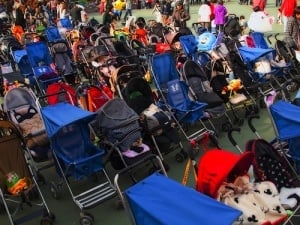
by Maman Aya (USA) | Jun 6, 2014 | 2014, Parenting, World Motherhood
I cried tonight. Real tears rolled down my face and my heart ached. My husband came and wrapped his arms around me and asked “Is it the suddenness of it?” You see, my dear friend is about to have a baby boy. Her first. I am so excited for her and so happy for her, she has wanted this for so long.
When she told me that she was pregnant, I immediately told her that I would give her my Bugaboo stroller – you know, the one that starts as a bassinet and converts to a big kid stroller as the child grows, has shocks on the tires (which you certainly need in the rough NYC streets) and accessories up the wazoo. I had my stroller for 7 1/2 years, and used it with both of my children. It was my son’s first “bed”, since I didn’t see the utility in buying a separate bassinet that he would only use for a few months. I had all of the accessories for it, from the cute little umbrella to the board that my son rode on once my daughter was born and it had been reconverted to a bassinet.
Last month my husband cleaned all of the hardware, vacuumed any loose crumb and reassembled the bassinet to prepare for this new baby boy to enjoy his turn to ride in his luxurious ride. He lovingly washed away our lives and children from it. I bought a new color canopy for it (I had red. My friend wanted blue).
I am happy that the stroller will bring such happiness to another family, especially a family that is so close with mine. I am happy that it will not collect dust, in a corner, now that my 3 1/2-year-old has almost outgrown it. I am happy that we are definitely getting our money’s worth, by passing it on to another child to use and grow into.
So why did I cry? Why am I still choked up as I write this? It’s because all of a sudden I realized that the removal of the stroller makes it so final.
Even though I said when my daughter was born, that I was done having children, somewhere in the back of my heart, I guess I still held out hope that we may decide to have another. My children have now started to ask for another baby, and I explained that we would not be having any more, but I am realizing that I haven’t fully accepted it.
I know that I currently feel overwhelmed with my work and family obligations. I can barely take care of myself and my family and home the way it is – how could I add another baby to the mix? I have finally gotten back to exercising and taking care of me – do I have the strength go through another pregnancy again especially as I am so close to turning 40 (shhh – don’t tell…. I will forever be 29 in my heart :))? I don’t think so. At least not right now.
I made the decision not to have anymore children, but taking our first stroller out of my home-made it so final, and I guess with this act I realized that maybe… just maybe… there is another soul out there who is destined to join our little family of four. Or, maybe not. But at least for now, if the time comes, that little soul will have a different stroller.
Have you ever doubted your choice in continuing/stopping to grow your family? What was your defining/questioning moment?
This is an original post to World Moms Blog by Maman Aya of New York City in the USA.
Photo credit to Carol at If By Yes.

Maman Aya is a full-time working mother of 2 beautiful children, a son who is 6 and a daughter who is two. She is raising her children in the high-pressure city of New York within a bilingual and multi-religious home.
Aya was born in Canada to a French mother who then swiftly whisked her away to NYC, where she grew up and spent most of her life. She was raised following Jewish traditions and married an Irish Catholic American who doesn’t speak any other language (which did not go over too well with her mother), but who is learning French through his children. Aya enjoys her job but feels “mommy guilt” while at work. She is lucky to have the flexibility to work from home on Thursdays and recently decided to change her schedule to have “mommy Fridays”, but still feels torn about her time away from her babies. Maman Aya is not a writer by any stretch of the imagination, but has been drawn in by the mothers who write for World Moms Blog. She looks forward to joining the team and trying her hand at writing!
More Posts

by Melanie Oda (Japan) | Jun 5, 2014 | 2014, Japan, Parent Care, School
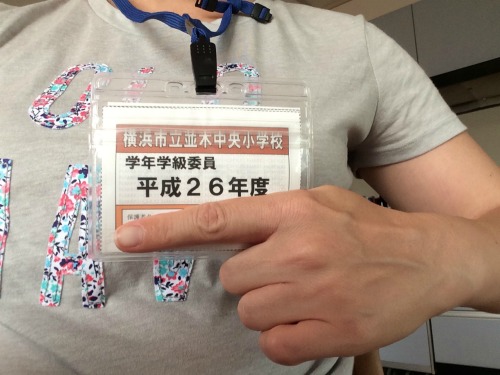
I have vague memories of the Parent Teachers Association (PTA) in the US, where I grew up. I remember the occasional school-wide meeting being held in the evening and a fall festival here, or there, involving baked goods. I’m not sure how much of my non-memory is due to just being an average kid (that is, extremely self-involved and just not noticing what the grown-ups were doing) or if the whole thing was just lower key.
Or, perhaps, my parents had some choice in the matter.
At any rate, PTA membership in Japan is by default. They take the fees out of your bank account right along with school supplies and school lunch payments. (Lunches her are amazing, by the way. A topic for another post.) I don’t know if it’s possible to opt out, or not. I certainly don’t know anyone who has tried!
The PTA at my children’s school is arranged like a pyramid, and at the top are the officers. Beneath them are the leaders of the four councils: class representatives, safety, and … well, in Japanese they call it “public information”, the group that makes the quarterly newsletter, along with the nomination committee. (These are the guys that try to suck you into being an officer for the next school year). Underneath that are the representatives from each class, and beneath all that is everyone else.
You are expected to serve on one of these councils at least once for each child.
This year, I ended up being the class rep for the first grade.
- Our job is to organize a school lunch “tasting day,” when parents can have lunch at school. But not with their child, in the Home EC room. (Both my daughter and I were disappointed by that.)
- Arrange and execute the washing of all the schools curtains. Twice. (I didn’t realize I should be washing my curtains at home twice a year….oops.)
- Collect and prepare for posting “bell marks,” the Japanese version of “Boxtops for Education,” collecting proofs of purchases that can be exchanged for school supplies.
- And lastly, mending the white smocks that children wear when distributing school lunches (in Japan, the children help prepare the lunch.)
Whew, that was quite a list!
Of course, all of these jobs require multiple letters sent home, which we prepare, and monthly meetings because … well, because this is Japan, perhaps.
Every family without fail is to volunteer for one of the tasks, either washing curtains, helping organize the bell marks, or mending the smocks.
When my oldest child started school, I was really surprised that the PTA were in charge of things that were so nitty-gritty.
I’m pretty sure, for example, the my mother never washed school curtains in her washing machine and then hauled them back to school to hang them up, still wet, after cleaning the school’s curtains rails.
So it makes me wonder …
What is PTA like in your country? Do you have to participate? What kind of things do you do?
This is an original post by our World Mom Melanie Oda from Japan.
Photo credit to the author.
If you ask Melanie Oda where she is from, she will answer "Georgia." (Unless you ask her in Japanese. Then she will say "America.") It sounds nice, and it's a one-word answer, which is what most people expect. The truth is more complex. She moved around several small towns in the south growing up. Such is life when your father is a Southern Baptist preacher of the hellfire and brimstone variety.
She came to Japan in 2000 as an assistant language teacher, and has never managed to leave. She currently resides in Yokohama, on the outskirts of Tokyo (but please don't tell anyone she described it that way! Citizens of Yokohama have a lot of pride). No one is more surprised to find her here, married to a Japanese man and with two bilingual children (aged four and seven), than herself. And possibly her mother.
You can read more about her misadventures in Asia on her blog, HamakkoMommy.
More Posts

by Susie Newday (Israel) | Jun 4, 2014 | 2014, Inspirational, Israel, Parenting, World Motherhood

Without exception, every living and breathing person needs love. (Duh….)
Obviously, we each have our own unique ways of expressing love and of feeling loved, but I find it amazing that babies, children and adults all have the same universal yearning and desire to feel loved. (In case anyone is interested in figuring out how they express and receive love, this is a great resource.)
The poem below is very personal and from the heart. I’m sharing it because only after I wrote it did I realize that the way I wrote my prayer/request for love, it’s really applicable for everybody not just me. Babies don’t know how to put into words what they need, but they need to be loved in all those ways. The same goes for kids, teens, adults and old people.
I’m sharing this in the hope that next time one of us has no patience for someone else, or someone is upset with someone else that we can maybe just take a moment and remember that in each of our actions is a plea for love.
Do you know how to recognize a request for love? Do you know how to ask for love?
Love Me
Love me tender
don’t hurt my soul
Love me gently
Don’t let me go
Love me unconditionally
make me feel safe
Love me intensely
help me believe in me
Love me compassionately
put your hand in mine
Love me fully
give me your attention & time
Love me sincerely
without a hesitation and doubt
Love me kindly
make me feel cherished & loved
Please be love*
so that I may learn from you
Love me like no other
and may our paths never part
*Be love as opposed to “to love”. When we are beings of love, we treat everyone including ourselves better.
This is an original post to World Moms Blog by our contributor, Susie Newday in Israel. You can find her on her blog New Day New Lesson.
Photo credits to the author.
Susie Newday is a happily-married American-born Israeli mother of five. She is an oncology nurse, blogger and avid amateur photographer.
Most importantly, Susie is a happily married mother of five amazing kids from age 8-24 and soon to be a mother in law. (Which also makes her a chef, maid, tutor, chauffeur, launderer...) Susie's blog, New Day, New Lesson, is her attempt to help others and herself view the lessons life hands all of us in a positive light. She will also be the first to admit that blogging is great free therapy as well. Susie's hope for the world? Increasing kindness, tolerance and love.
You can also follow her Facebook page New Day, New Lesson where she posts her unique photos with quotes as well as gift ideas.
More Posts - Website
Follow Me:





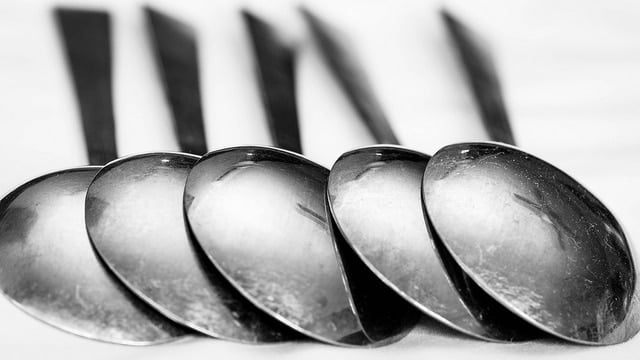
by Olga Mecking | Jun 2, 2014 | 2014, Awareness, Being Thankful, Child Care, Health, Kids, Life Balance, Maternal Health, Me-Time, Motherhood, Netherlands, Parenting, World Motherhood, Younger Children
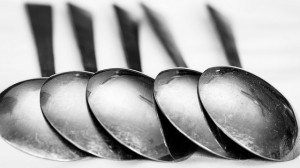 Recently, I’ve been reading about the Spoon Theory (also sometimes called the token theory). The idea is that we’re all given a certain amount of spoons (or tokens) each day—metaphorically of course–to spend on all the things that we need to get done during the day.
Recently, I’ve been reading about the Spoon Theory (also sometimes called the token theory). The idea is that we’re all given a certain amount of spoons (or tokens) each day—metaphorically of course–to spend on all the things that we need to get done during the day.
It is usually applied to explain disabilities or chronic illnesses, which often can’t be seen but still make people’s lives difficult (like Lupus, Chronic Pain or Aspbergers). But I actually think that, without dismissing the experiences of these people, the spoon theory also can be expanded to include moms.
Just think of all the things you have to do during the day, and then imagine doing them without children. You wouldn’t even have to think when you got dressed in the morning. Eating breakfast would be simple and effortless. You’d be able to get out of the house in a matter of minutes and you might even be able to get places on time.
When you’re a mom, suddenly everything takes more time. You don’t only have to make breakfast for yourself, you make it for one, two, three, or more people. Here go three spoons- and I don’t mean the ones you use to eat breakfast.
You want to get out of the house. You put your coat on, your children’s coats on. Your price in spoons depends on the amount of children you have and the season- less children cost less spoons, winter is more expensive than summer.
Whatever you do, whether you are a working mom or a SAHM, you likely will be out of spoons by the end of the day. Some days are better and you may even have a few spoons left. Some days are horrible and you run out of spoons before noon. The unexpected temper tantrum costs a spoon or three. Taking your child to the hospital because he’s sick is another five spoons.
Remember, you only get a certain amount of spoons per day and that amount is limited. You can borrow the spoons from the next day but that could be the very day your child gets sick or when she decides that from now on, she will absolutely refuse to do whatever you ask her to do.
But not all moms are given equal amounts of spoons. Some have less than others. These are the moms who have disabled children. These are single moms with two jobs and no support. These are the moms all over the world living in poverty. They struggle every day to provide the best for their children. Yes, parenting under such circumstances is definitely more spoon-costly.
But it isn’t easy even for a family without such challenges. So what can we do? Spend our spoons wisely. Prioritize.
For example, in my case, perfectly folded laundry isn’t worth a spoon but a nicely prepared dinner most definitely is. We can try to replenish our spoons by getting some me-time. We can remember to sleep. We can get help- whether it’s from family, friends or childcare.
These are the things we can do for ourselves. But there are also things we can do for others. When thinking about how to spend your spoons or tokens, please set aside a certain amount for your fellow moms. You can do it by offering support. Offer a shoulder to cry on, extend your helping hand, say encouraging words.
It may seem like spending your own precious spoons but it is really a kind of investment. Because any price is easier to pay if everyone pitches in.
But, all economic and metaphorical imagery aside, I just want to point out the obvious: motherhood is hard. Let’s be kind to ourselves. And let’s help each other out.
Of course, we don’t really need such theories to explain how hard it it so be a mom. But I thought the spoon theory is a rather good way to illustrate the challenges of motherhood.
What are you thoughts on this? Is it helpful to think of your day in terms of having a limited number of spoons (or tokens) to spend?
This is an original post to World Moms Blog from our Polish writer in the Netherlands, Olga Mecking.
The image used in this post is credited to Nicki Mannix. It holds a Flickr Creative Commons attribution license.
Olga is a Polish woman living in the Netherlands with her German husband. She is a multilingual expat mom to three trilingual children (even though, theoretically, only one is trilingual since she's old enough to speak). She loves being an expat, exploring new cultures, learning languages, cooking and raising her children. Occasionally, Olga gives trainings in intercultural communication and works as a translator. Otherwise, you can find her sharing her experiences on her blog, The European Mama. Also take a while to visit her Facebook page .
More Posts - Website
Follow Me:























